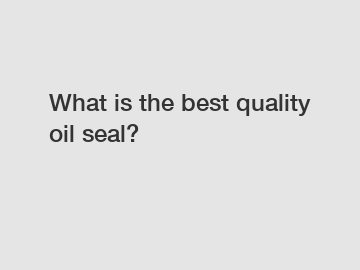What is the best quality oil seal?
What is the best quality oil seal?
When it comes to choosing the best quality oil seal, there are several factors that need to be considered. Oil seals play a crucial role in preventing leaks and protecting machinery from contaminants, making it essential to select a seal that offers durability, reliability, and efficient performance. In this article, we will delve into the various points to consider when determining the best quality oil seal.
1. Material:

One of the first aspects to consider is the material used in the manufacturing of the oil seal. The material should have excellent resistance to temperature, pressure, chemicals, and lubricants. Common materials used for oil seals include nitrile rubber, fluorocarbon, and polyacrylate. Each material has its own set of advantages and disadvantages, and the choice depends on the application requirements.
2. Design:
The design of an oil seal plays a vital role in its performance. The seal should have the ability to maintain a tight seal under various operating conditions. Factors like lip design, spring type, and reinforcement should be taken into account. Additionally, a good oil seal design should also consider factors like shaft speed, misalignment, and fluid compatibility.
3. Compatibility:
Compatibility is a key consideration when selecting an oil seal. It is important to ensure that the seal is compatible with the fluid or lubricant used in the machinery. Different fluids have different effects on oil seals, and using an incompatible seal can lead to premature failure and leaks. Therefore, it is crucial to choose a seal that is specifically designed for the intended application and fluid type.
4. Quality Assurance:
When it comes to oil seals, quality is of utmost importance. Ensuring that the seal meets industry standards and certifications is crucial for its performance and longevity. Look for seals that have been tested rigorously and are certified by reputable organizations. Oil seals that meet industry standards are more likely to provide a reliable and long-lasting sealing solution.
5. Application-Specific Considerations:
Different applications have varying requirements for oil seals. For example, seals used in high-speed applications may require additional features like enhanced heat dissipation and better pressure resistance. On the other hand, seals used in extreme temperature environments may need to be made from materials with exceptional resistance to heat and cold. Understanding the specific requirements of the application will help in selecting the best oil seal for the job.
In conclusion, selecting the best quality oil seal requires careful consideration of several factors. These include the material used, design features, compatibility, quality assurance, and application-specific requirements. By taking these points into account, one can make an informed decision and choose an oil seal that offers optimal performance, durability, and reliability.
If you want to learn more, please visit our website Japanese standard O-ring, custom o rings, king seal.


